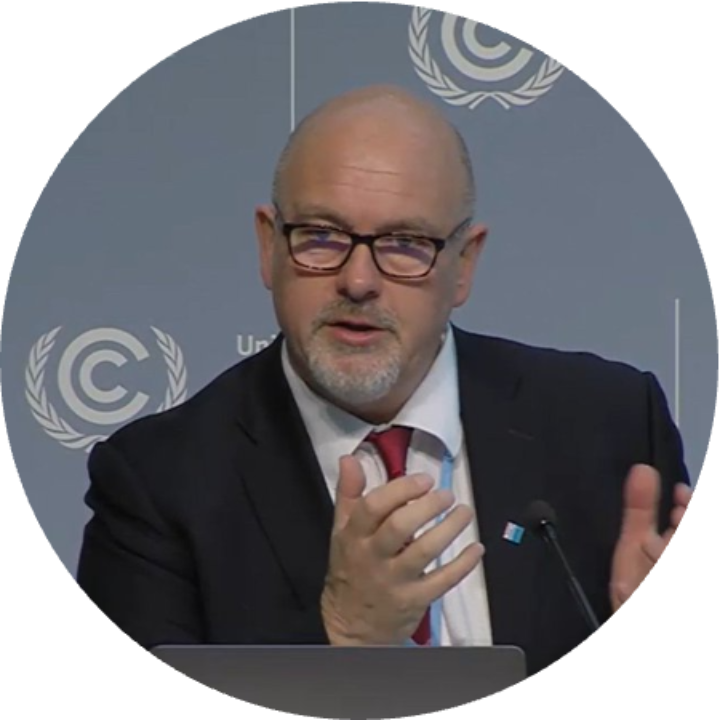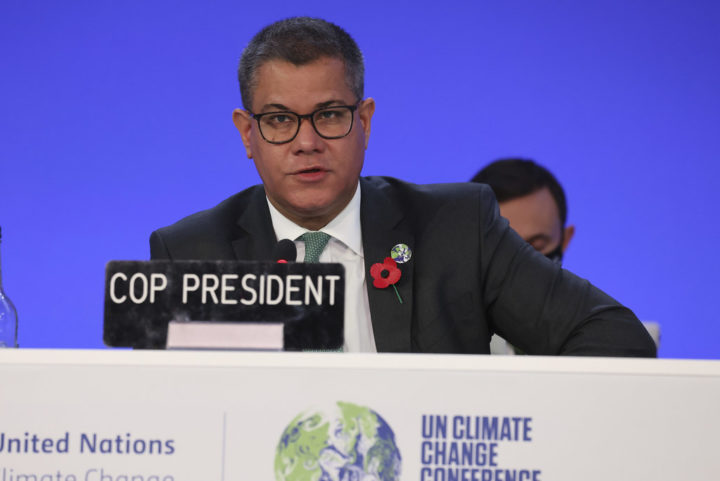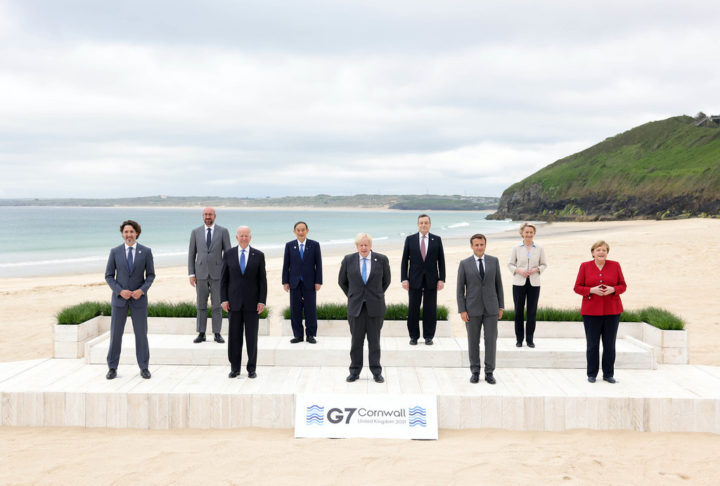What next for progress to COP27?
Experts reflect on key global meetings in June and the job ahead of COP27 in Egypt.

By Gareth Redmond-King
@gredmond76Share
Last updated:
Over half way between COP26 and the next climate summit, in Egypt, progress on promises made in Glasgow is slow. It’s time for political leaders to get serious about delivering on promises to keep 1.5° alive. That includes translating action to reduce reliance on fossil fuels into stronger targets to close the ambition gap. But also more effort and finance to support developing countries, and urgent actions to address the looming global food crisis. That’s the message from experts watching key global meetings this June, ahead of G7 leaders meeting in Germany.
At the start of June, climate negotiators met in Bonn to progress decisions from the Glasgow COP, and plan ahead for COP27. With senior politicians from most countries largely absent from these technical talks, and progress limited, attention turns next to more high-level meetings – most notably, G7 leaders on 26th June.

ECIU Senior Associate, Richard Black, suggests the Bonn meeting had limited scope for breakthroughs:
“There are lots of parallel processes going on; a lot of them at the beginning. So what we’ve seen are the opening remarks – the opening evidence, to enable delegates to judge where we are, and therefore what’s to be done about it. Processes kicked off at Glasgow last year are having their first outing. So a lot of what we’ve seen has been countries laying down opening positions.”
See the full ECIU Talks interview with Richard Black here:
Ambition gap & pivot away from fossil fuels
The considerable remaining ambition gap, recently set out in our report on the world’s largest economies, the G20 nations, leaves us far short of progress towards the 1.5°C commitment in the Paris Agreement.
But the world has changed since the meeting in Glasgow, and there are new imperatives driving faster reduction in reliance on volatile and expensive fossil fuels.

Dean of the Fletcher School at Tufts University, and former senior UN and World Bank official, Rachel Kyte, reflected on the opportunity this presents for enhancing emissions pledges:
“So far, the EU’s view is that this is the double-down on renewable energy … Europe is pivoting away, and wants to build up its renewable energy capability; that’s important. It needs to do that for the rest of the world as well. We must not forget those who have no energy, so there needs to be seriousness about closing the energy access gap. And as the IEA keeps telling us, the first thing is we have to be much more efficient. So, none of this is new. But it all has to happen really quickly now.”
Loss and damage
One of the processes kicked off at Glasgow is the dialogue on loss and damage. Parties left COP with developing countries disappointed at no movement on a ‘finance facility’: a means by which wealthier countries, emitting for longest, provide financial support to those already bearing costs, and least able to afford to. As Richard noted, the Bonn meetings had a new piece of evidence in front of them:
“The report by the Climate Vulnerable Forum and the V20 countries calculated the amount of loss and damage they have collectively undergone in the last 20 years. And it’s a big number – it’s more than $500 billion. And that really is an underestimate of the total, because it’s not all developing countries, and because almost certainly when you count things up you do underestimate the impact, particularly of the progressive events such as sea level rise … the first time that we’ve had a dollar number on the table for loss and damage”
Loss and damage is shaping up to be a key issue by which COP27 may be judged, says Rachel Kyte, warning of the risk of continued ‘erosion of trust’ if there is not real progress:
“The fact you can’t get agreement in Bonn that there would be any sort of package on loss and damage is a poke in the eye for all the negotiators and the people who went to Glasgow in goodwill. Because on the final day in Glasgow, in that emotive final session, you had the G77 [negotiating group of developing nations] saying ‘OK, we understand we’re not going to get what we want, but do you commit to negotiate in good faith?’ And they were told that they would get that negotiation in good faith.”
See the full ECIU Talks interview with Rachel Kyte here:
Presidencies and looking ahead to COP27

COP26 undoubtedly delivered progress and momentum. But the meeting in Bonn has seen ‘low-level rumblings of dissatisfaction’ with both UK and Egyptian presidencies suggests Richard, with Rachel noting the UK COP26 presidency “is no longer a total government approach. The COP26 president in the person of Alok Sharma is doing a valiant job. But the rest of his government has disappeared into a series of domestic crises of their own making, and a war.”
Richard reflected, though, that “we are at the beginning of many of these multi-year processes that were kicked off at Glasgow”. But as expectations grow amongst people, civil society and businesses for leadership on climate, that poses a problem when those processes will not be advanced enough to offer solutions at COP27.
But, he suggests, there is still clearly a set of outcomes that will be necessary in Egypt:
“It has to involve some kind of step up on the rate of mitigation, because the science is so strong and so clear, and currently we’re not on track for anything like 1.5°C. It has to include progress on what the global goal on adaptation needs to look like. We have to see some movement on the finance beyond 2025 [ramping up beyond the $100bn]. And we have to see some movement on loss and damage. Particularly the poorest and most vulnerable developing countries will want to see some sort of [loss and damage] finance facility established, and soon. Because they’re already paying for losses from climate impacts. …What is it that is going to satisfy everyone on loss and damage is, I think, the single biggest obstacle ahead.”
Rachel similarly observed that the strategic priorities haven’t changed:
“We need to massively increase the amount of investment going into green growth and the green future. We need to increase the amount of funding going into resilience. We need to solve the loss and damage issue. The value at risk in countries around the world from existing climate impacts and the kinds of extreme weather that we’re seeing in every continent this week alone – countries are losing percentage points of GDP … There is urgency for the international financial system – the multilateral development bank system: where is the G7 pressure on them to be using their finance more effectively? How this is all packaged and brought to COP, and how the Egyptians want to showcase how this all fits together, is what we’re not completely clear on yet.”
G7 leaders - food

Attention turns now to G7 leaders, meeting in Germany between 26th and 28th June. Top of their agenda, believes Rachel, will be food prices and shortages, which she describes as a “real and present danger”, with the immediate need being a humanitarian corridor for getting grain out of Ukraine, but also tackling issues around price and supply of fertilisers.
If we can’t solve that, then “we’ll lose multiple growing seasons, and so we’re going to have entrenched famine if we’re not careful.”
Food has risen sharply and dramatically up the global agenda since Russia’s invasion of Ukraine. Both are major exporters of some staple foodstuffs, and both are projected to see significantly lower exports this year. Food prices were already rising before the invasion, driven by a combination of the cost of energy for farmers, of chemical fertilisers made from fossil fuels, and by weather impacts in some places.

Edward Davey, International Engagement Director for the Food and Land-Use Coalition, and a Co-Director at the World Resources Institute, agrees on the interaction between climate change and the growing food crisis:
"The global food security crisis is directly attributable to Ukraine, but it's also attributable to climate change, to covid, and to a fragile and interconnected food system
"The link between the food system and fossil fuels and greenhouse gases is very important. The global food system drives at least 25% of greenhouse gas emissions.
"There is a chance before us, in the midst of this dreadful crisis, to respond in the hour of need to the humanitarian crisis but at the same time to try to pivot to a more resilient food system."
See the full ECIU Talks interview with Edward Davey here:
Today we are seeing extreme weather in places like France, the US and India, predictions of harvests have fallen, and prices of crops like wheat have become volatile, at times reaching historic highs.
Reflecting on the likely focus of G7 leaders in Bavaria, ECIU’s climate and land programme lead, Matt Williams said:

“We’re seeing drought and heatwaves reduce yields in some of the key wheat-producing countries, exacerbating shortages and driving up prices. With the food system responsible for up to one third of global greenhouse gases, farming and the wider food industry can help themselves by cutting the emissions driving climate change. With gas surging in cost and also a key ingredient in many fertilisers, there is added incentive to find new, cleaner alternatives to fossil fuels.”
G7 leaders - climate
Climate also remains fully in the frame for G7 leaders, but the question will be about the extent to which they move on beyond simply reiterating existing commitments, suggests Rachel:
“Their capacity and political will to act is what we must be looking for. The extent to which they don’t fall foul of domestic special interest money which is saying ‘we have an energy price crisis – we’ve got to frack in Blackpool or we’ve got to open up drilling in sacred lands in the United States. The idea that this actually will solve anything in the short to medium term… the G7 has to double-down on its medium-term commitments and talk powerfully to their own publics about what this means.
“It’s extraordinary that Canada, the United States, and the United Kingdom are not having a conversation at all about energy efficiency. The EU is, and Japan is to a lesser extent. But managing energy demand would seem to be an absolutely critical domestic response which would have a powerful international impact.”
For G7 leaders, and for nations meeting at COP27 in November, the interconnection of crises - and therefore of solutions - is coming much more to the fore. Delivery on promises made in Glasgow to raise ambition and provide financial support to developing nations for cutting emissions and adapting, will remain in the spotlight at international meetings like the G7.
Experts in food systems and those on climate are making the connections more explicitly for political leaders - as Edward explains in the context of the Food and Land Use Coalition seeking to bring together a high-ambition group of countries at COP27 and COP28:
"To say that, notwithstanding the current crisis, we are going to hold the course, we are going to have a national food systems plan, we're going to implement it, and we're going to ask the world for support in doing it. We had that for oil and gas at COP26, with the Beyond Oil and Gas Alliance led by Denmark and Costa Rica and 15 countries came forward. Let's try and have the same in the food system. I think that's a really urgent task before us and I'm hoping that will be advanced at the German meeting on Friday."

Read more about the G20 ambition gap in our report here.
Share